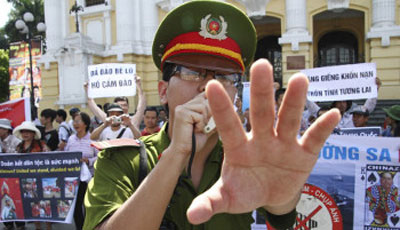By Pham Chi Dung, Asia Sentinel
Some may be coming from a surprising source – the Communist Party
A little democracy needed

Vietnam’s pro-democracy activists appear to have missed an unprecedented opportunity in the wake of the July visit to the US by head of state Truong Tan Sang. That was followed by an official Paris trip by Prime Minister Nguyen Tan Dung that was intended to signal an axis rotation to the West not unlike President Barack Obama’s pivot to the East.
The fact is that a vigilant police force has assiduously rounded up enough protesters and dissident bloggers to keep their lesser counterparts in line. The inability to capitalize points to the fact that if there is going to be change in Vietnam’s political makeup, it is likely to come from factions inside the Vietnamese Communist Party rather than from without.
There are signs of growing factionalism and calls for change within the party. At the same time, there are outside forces agitating for change, particularly the United States government, which is urging greater political and intellectual freedom as a condition of Vietnam’s entry into the TransPacific Partnership, a huge trade pact that Vietnam needs both economically and as a political bulwark against China and its increasingly aggressive territorial claims in the South China Sea.
Some of the most enthusiastic activists tried to prove an opposition presence through 11 anti-China demonstrations in Hanoi in 2011 and pluralistic voices on social media ever since. They have also been unable to capitalize on the so-called Petition 72, drafted earlier this year by 72 respected scholars and former government officials. It offers a proposed constitutional alternative to Vietnam’s current one. Petition 72, among other proposed changes, would would abolish Vietnam’s one-party structure.
Yet there is a fundamental difference in the mentality of the intellectuals considered close to the Party.
In an April 26 interview on BBC Vietnam, Nguyen Dinh Tan, a professor at the Saigon Institute of National Politics-Administration, said: “Indeed in Vietnam we can say that there is no rival with the Vietnam Communist Party. If there are to be opponents of the Vietnam Communist Party as an organization, I think there is none.”
Tan was right. Objectively, the answer is, “No.” Even the proposed establishment of a Social Democratic Party by lawyer Le Hieu Dang in August, which almost became a reality, does not seem to make a big enough impression on the ruling party to be a political counterweight.
Various evaluations of the current situation estimate that there are three groups within the Vietnamese Communist Party. The first consists of about 30 percent of party and government intellectuals, including officials who are considered “loyal” and possess the rights and privileges of the system and have vested interests in keeping things the way they are.
The second group, comprising about 20 percent of the party, are intellectuals in state agencies who no desire change but aren’t in a position to act on their views.
The third group, making up about half the party intellectuals, isn’t particularly affiliated with any special interests or positions and have an eclectic outlook.
If this is accurate then then a well-organized civil society would be able to attract at least half of the intellectuals working for the party and the state.
Read the full article by Pham Chi Dung, Asia Sentinel.

